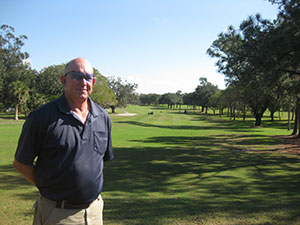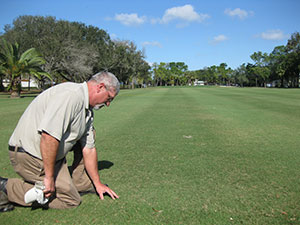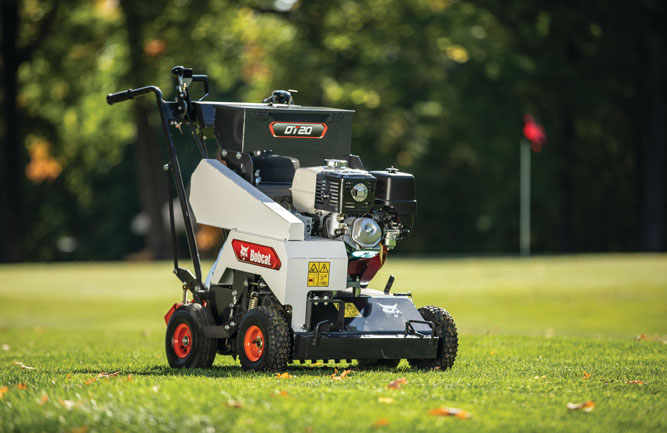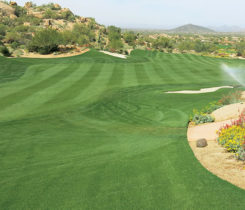Getting over overseeding
When Allen Brissenden, CGCS, decided to stop overseeding his Dunedin, Fla., golf course three years ago, he encountered pushback from the members and the golf pro, who felt overseeding helped sell the course to players during winter months. But he persuaded the board of directors it would all work out and took the plunge in 2010.

Allen Brissenden, golf course superintendent at Florida’s Dunedin Golf Club, is pleased that weed pressure is down dramatically after deciding to stop overseeding.
“My goal in forgoing overseeding was to strengthen the Bermudagrass base while reducing nematode pressure,” says Brissenden, golf course superintendent at Dunedin Golf Club since 2003. “With overseeding, you generate new roots, which amplify nematode populations. We used to struggle in the springtime when the course was totally dirt bare for a period.”
One of the oldest golf courses in Florida, Dunedin is a Donald Ross design, built in 1925. As the original host of the PGA of America and previous host of the Senior Open, the course holds a lot of history. All the famous golfers played Dunedin back in the 1940s and 1950s.
“We’re such an old course, you can imagine the weed problems we have,” adds Brissenden. “We had unbelievable goosegrass pressure in the spring and fall — at least 20 percent on our fairways — as well as signalgrass, kyllinga, spurge and sedges.”
Monumental weed pressure
Because of his monumental weed problems, Brissenden was cautious about taking out the overseeding. He wanted to make sure he had an effective preemergence herbicide that could handle the serious pressure. He had heard about Echelon herbicide from FMC Professio
nal Solutions at various turf meetings and decided to give it a try.
The first year he didn’t overseed, Brissenden applied Echelon sparged on fertilizer at 0.3% – or 0.75 lb. a.i. per acre on 250 – 300 lb. fertilizer, taking it treeline to cart path. “We had great success with Echelon,” he says. “It did a fantastic job on spurges, goosegrass, crabgrass, Poa annua and sedges.”
Originally, Brissenden made split applications of Echelon in the spring and fall. But he soon switched to making the first application at the end of January and the second treatment in April. “We’re right on the Gulf of Mexico, so our soil warms up pretty quickly,” he notes. “We realized that we need to get ahead of the weeds faster with our preemergence applications.”
The split treatment worked. “Not only did it clear up weeds problems for that year, it seemed to reduce our overall pressure,” adds Brissenden. “We hardly get any spurge now and Poa annua, sedge, crabgrass and goosegrass seem to be a lot less each year.”
Brissenden’s assistant, Jeff Troutwine, used to spend 40 hours a week spot spraying goosegrass on fairways during the season. Now, he spot sprays the entire golf course in two days. “Dunedin’s 15th fairway used to be my worst nightmare because it was covered with goosegrass,” says Jeff. “Now it’s my pride and joy.”
After three years without overseeding the Dunedin course looks great. Nematode populations are dramatically reduced and weed pressure is minimal. “The herbicide and fertilizer combination really helped strengthen our turf,” adds Brissenden. “Now we have a good base so even if we do have cold weather and it goes brown, we still have grass to play off.”
An added advantage? Eliminating the overseeding procedure saved Dunedin a lot of time and money. The board is happy. The members are happy. Even the golf pro admits it was a good idea.

The 15th fairway at Florida’s Dunedin Golf Club went from Jeff Troutwine’s worst nightmare to his pride and joy, after he gained control of a severe goosegrass infestation.
A Super’s Story
Though he’s been a superintendent for 25 years, Allen Brissenden came to America as a rugby player for UCLA in his early twenties. A native of South Africa, he holds an engineering degree from Johannesburg Technical College.
After his rugby career ended, Brissenden began working in golf course construction, moving to Florida in 1983. The Canadian Hockey Players hired him to manage their three Florida golf courses from 1989-2003, when he came on board with Dunedin Golf Club.
“My turf schooling has primarily been through the Golf Course Superintendents Association of America,” he adds. “I’m a huge supporter and always attend the annual meeting.
Hear what Allen Brissenden has to say about gaining control over weeds at the Dunedin Golf Club.










